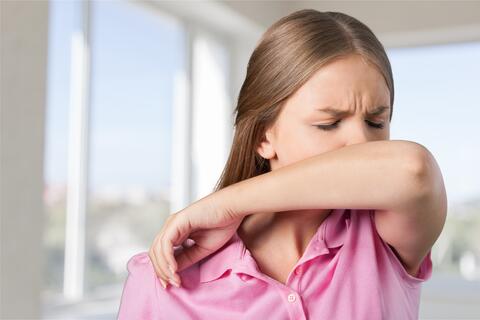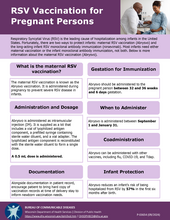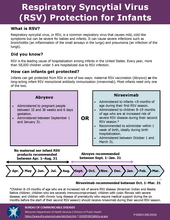Respiratory Syncytial Virus (RSV)
General information
RSV is a major cause of respiratory illness in all age groups.
Among infants and young children, it is the most common cause of bronchitis, croup, ear infections, and pneumonia.
Older adults and infants and young children are more likely to get serious complications if they get sick with RSV.
A vaccine protects adults from RSV. A monoclonal antibody (injection) is used to protect young children from RSV.
To find current levels and transmission of respiratory viruses in Wisconsin, visit Respiratory Virus Data.
Respiratory viruses are primarily spread to others by respiratory droplets and aerosols that travel through the air when an infected person breathes, speaks, sings, coughs, or sneezes. They can also be spread by contact – either with the infected person (like kissing or shaking hands), or by touching contaminated surfaces and then touching your mouth, nose, or eyes. These viruses can survive on surfaces for many hours.
People infected with RSV are usually contagious for three to eight days. However, some infants, and people with weakened immune systems, can continue to spread the virus even after they stop showing symptoms, for as long as four weeks.
Children are often exposed to and infected with RSV outside the home, such as in school or child-care centers. They can then transmit the virus to other members of the family.
People infected with RSV usually show symptoms within four to six days after getting infected. Symptoms may include:
- Runny nose
- Cough
- Sore throat
- Fever
- Decrease in appetite
- Wheezing
There is no specific treatment for illnesses caused by RSV. Most people will recover on their own. You can relieve your symptoms by:
- Taking pain or fever medications (note: never give aspirin to children)
- Using a room humidifier or taking a hot shower to help ease a sore throat and cough
- Drinking plenty of liquids to stay hydrated
- Staying home and resting
If you are concerned about your symptoms, contact your health care provider.
For RSV protection the CDC (Centers for Disease Control and Prevention) recommends:
Adults: Adults 75 years and older, and adults ages 50–74 who are at increased risk of severe RSV, get a single dose of RSV vaccine.
Infants and children: Infants and children can get protected through either maternal RSV vaccination or a monoclonal antibody (nirsevimab or clesrovimab). Both products are not needed for most infants.
Maternal RSV vaccination
- Pregnant people get one dose of the Abrysvo vaccine between 32 weeks and 36 weeks and six days of pregnancy. Abrsyvo is administered during September–January and provides protection to the infant during RSV season. Learn more about the American College of Clinicians and Gynecologists (ACOG) recommendation for maternal RSV vaccination.
OR
RSV monoclonal antibody (nirsevimab or clesrovimab)
- Infants younger than 8 months born during, or entering, their first RSV season get one dose of a monoclonal antibody (nirsevimab or clesrovimab). Monoclonal antibodies are administered October through March.
- Children 8-19 months old who are at increased risk for severe RSV disease should also receive the monoclonal antibody (nirsevimab).
Find out if you or your children are protected from RSV. Check our Wisconsin Department of Health Services (DHS) Wisconsin Immunization Registry.
If you’re worried about cost, your family may be eligible for free vaccines. Read about our Vaccines for Children program and Vaccines for Adults program.
DHS maintains several respiratory illness data dashboards that include RSV-related data from multiple data sources.
Visit Respiratory Illness Data Snapshot to view RSV-related data in Wisconsin.
When is the RSV season?
In Wisconsin, the RSV season starts in the Fall and goes until the Spring (typically October through March). RSV infections are most common in the fall and winter. The Advisory Committee on Immunization Practices (ACIP) recommends the maternal vaccination (Abrysvo) be administered September 1–January 31 while the long-acting infant monoclonal antibody immunization (nirsevimab or clesrovimab) should be administered October 1–March 31.
Can unexpired nirsevimab from last season be used this season?
Yes, nirsevimab has a shelf life of 18 months. Unexpired doses from last season may be used in the subsequent RSV season as long as they have been properly stored.
Can Abrysvo and RSV monoclonal antibody be administered with other vaccines?
Yes, Abrysvo can be administered at the same time as other vaccines, such as flu, COVID-19, and Tdap. Note that Abrysvo is the only approved RSV vaccine for pregnant people. RSV monoclonal antibody can also be administered with infant vaccines, such as the birth dose Hepatitis B vaccine and other routine childhood vaccines.
Does the infant need RSV monoclonal antibody if the birthing person got Abrysvo?
Most infants born to a birthing person who received Abrysvo do not need RSV monoclonal antibody. However, if the infant is born less than 14 days after the birthing person received Abrysvo, the infant should receive RSV monoclonal antibody. Learn about the rare circumstances in which infants should receive monoclonal antibody even if the birthing person received Abrysvo.
Which 8-19 month old children are eligible for nirsevimab?
Children 8-19 months old who are at an increased risk of severe RSV disease should receive nirsevimab during their second RSV season, regardless of prior maternal and infant immunizations received. High risk 8-19 month olds should receive two 100 mg doses, regardless of weight. High risk children include the following groups:
- American Indian and Alaska Native children
- Children who are severely immunocompromised
- Children with cystic fibrosis with severe disease
- Children with chronic lung disease of prematurity who require medical support during the six months before the start of their second RSV season
For more information, visit Nirsevimab Recommendations for Infants and Young Children.
How do we protect infants born outside of the RSV season?
Infants born April–September to a birthing person who didn’t receive Abrysvo and are younger than 8 months of age are recommended to receive nirsevimab at the start of the subsequent RSV season; per the Advisory Committee on Immunization Practices, administration should begin October 1 in Wisconsin.
How can providers clearly indicate the birthing person’s receipt of Abrysvo to inform infant immunization needs?
Providers should make a clear note in the birthing person’s chart upon receipt (or confirmation of receipt of Abrysvo and encourage patients to bring a hard copy of their vaccination records to the birthing facility to inform infant immunization needs.
If it is unknown whether or not the birthing person got Abyrsvo, what steps should be taken to determine RSV monoclonal antibody eligibility?
Efforts to determine the birthing person’s vaccination status should be made by seeking the information from the electronic health record (EHR) or the birthing person, if able. Alternatively, search the Wisconsin Immunization Registry (WIR) upon receiving consent from the birthing person. If the birthing person’s status remains unknown, CDC recommends administering RSV monoclonal antibody.
What should birthing facilities do if they do not administer RSV monoclonal antibody during the birthing stay and the birthing person did not receive Abrysvo?
ACIP recommends that all infants younger than 8 months of age receive RSV monoclonal antibody within seven days of birth. For some, this will be in the hospital, while for others, it will be at the infant’s first health care provider visit. If RSV monoclonal antibody is not administered at the birthing hospital, a clear note should be made in the infant’s chart to ensure they receive RSV monoclonal antibody at their first health care provider visit.
What information should I include when referring a pregnant person to a vaccine provider if I don't carry the vaccination?
When referring patients to other vaccine providers, it is recommended to indicate the pregnant patient’s gestational age and positive pregnancy status, alongside the vaccine(s) to be administered.
Should Abrysvo be given to pregnant people during every pregnancy?
There is currently no recommendation for pregnant people to receive the RSV vaccine during any subsequent pregnancy after initial RSV vaccination. Infants should receive RSV monoclonal antibody during their first RSV season.
If both nirsevimab and palivizumab are available for eligible high-risk patients, which should they receive?
All infants eligible for nirsevimab should receive nirsevimab. Palivizumab should be administered to eligible high-risk patients if nirsevimab is unavailable.
Should patients who don't qualify for nirsevimab, but do qualify for palivizumab based on the 2014 AAP policy statement receive palivizumab, nirsevimab, or neither?
Neither. According to the 2024 Red Book the only instance when palivizumab should be administered is when nirsevimab is recommended, but is not available and the patient is eligible to receive palivizumab.
FAQ resources
- Nirsevimab Frequently Asked Questions | American Academy of Pediatrics
- Maternal RSV Vaccination Frequently Asked Questions | American College of Obstetricians and Gynecologists
- Frequently Asked Questions About RSVpreF (Abrysvo) Vaccine for Pregnant People | CDC
Information for providers
Use these resources from the Wisconsin Department of Health Services (DHS), the CDC (Centers for Disease Control and Prevention), the American College of Obstetricians and Gynecologists (ACOG), and the American Academy of Pediatrics (AAP) to learn more about RSV and ways to protect people.
- DHS: Respiratory Illness Vaccine Promotion Toolkits: Toolkits regarding the importance and promotion of respiratory illness vaccination for:
- CDC: Respiratory Syncytial Virus Infection (RSV) Homepage
- CDC: Options for Infant RSV Protection At a Glance (PDF)
- CDC: Healthcare Providers: RSV Vaccination for Pregnant People
- CDC: Frequently Asked Questions (Abrysvo) Vaccine for Pregnant People
- ACOG: Respiratory Syncytial Virus (RSV) Infographic (English)
- ACOG: Respiratory Syncytial Virus (RSV) Infographic (Spanish)
- CDC: Healthcare providers: RSV Prevention Information
- AAP: RSV Prevention
- AAP: Nirsevimab Administration Visual Guide (PDF)
- CDC: Clinical Features
- DHS: Respiratory Syncytial Virus (RSV)-associated Hospitalizations, EpiNet, P-03519 (PDF)
- DHS: Respiratory Syncytial Virus (RSV)-associated Pediatric Mortality, EpiNet, P-03520 (PDF)
- AAP: Nirsevimab Administration Visual Guide (PDF)
- ACOG: Recommendation for RSV Vaccination for Pregnant Individuals (PDF)
Share these materials from the Wisconsin Department of Health Services (DHS), the CDC (Centers for Disease Control and Prevention), and the American College of Obstetricians and Gynecologists (ACOG) with patients to learn more about RSV and ways to protect people.
- DHS: Wash Your Hands!, P-01710: Flyer with instructions on how to properly wash hands.
- CDC: Respiratory Syncytial Virus Infection (RSV) Homepage
- CDC: RSV in Infants and Young Children (PDF) (English)
- CDC: RSV in Infants and Young Children (PDF) (Spanish)
- CDC: How RSV Spreads
- CDC: Older Adults are at High Risk for Severe RSV Infection (PDF) (English)
- CDC: Older Adults are at High Risk for Severe RSV Infection (PDF) (Spanish)
- ACOG: Pregnant? Top 3 Reasons Why You Need the RSV Vaccine (English)
- ACOG: Pregnant? Top 3 Reasons Why You Need the RSV Vaccine (Spanish)
- ACOG: Why I recommend the RSV Vaccine to my Pregnant Patients
Questions about respiratory syncytial virus? Contact us!
Phone: 608-267-9003 | Fax: 608-261-4976
Wisconsin Local Health Departments – Regional offices – Tribal agencies




